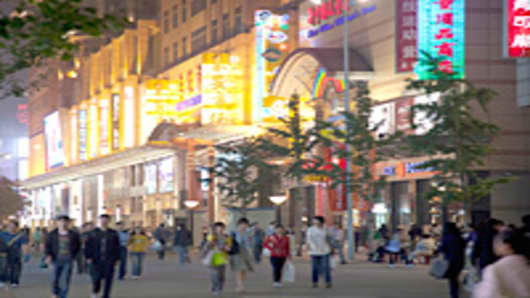China may soon become known as a nation of spenders, rather than savers, thanks to Beijing's efforts to let consumption drive economic growth.
While the government's latest five-year plan is focused on boosting residents' wealth through tax cuts and improved welfare, it seems the explosive growth of e-commerce is now a key driver of urban spending.
Sales done online nationwide have doubled to almost $80 billion in 2010, according to iResearch data, compared to total retail sales, which have grown nearly 20 percent per year in the last five years. The lion's share of the market goes to online retailer Taobao, which is said to 2,950 pairs of shoes, 58 mobile phones and 52 PCs, every minute.
Consumers are also seen to be buying more daily necessities online, rather than just novelty items, said Annie Hsiao, president of media agency Maxus China, reflecting their increased confidence at shopping online. Other online retailers like 360Buy and Vancl have also reported surging sales.
Hopes that more Chinese will embrace e-commerce helped Dangdang.com stock rise 87 percent at its debut on the New York Stock Exchange. Also planning a listing is taxi touchscreen operator Touchmedia — whose sales have shot up 15 times over the past three years — benefiting from China's increase in mobile and affluent urban consumers.
Experts say Chinese shoppers are fast-becoming comfortable with the ease of mobile e-commerce, compared to their Western counterparts.
"China's consumerism is in many ways bypassing stages of conventional media the west went through," says Neil Ducray, Managing Director of Touchmedia. He says data have shows that 41 percent of young adults would rather use mobile internet rather than PC internet, compared to around 20 percent in western countries.
The rapid growth in this new shopping trend has also spawned countless startups. Just months after the Groupon concept became popular in the U.S., China had its own copycat websites, with thousands of them offering group buy deals. There's also an explosion in ways to reach consumers. Need a bank loan? Apply in your taxi. Want to buy a new car? Ring the shopping channel hotline. Dinner plans? Download a group buy voucher onto your mobile.
While technology has helped drive urban spending, policy is the catalyst for countryside consumption. The government's incentive programs for rural appliance sales have seen revenues more than doubleto 170 billion yuan ($25 billion) in 2010. Thanks to a 13 percent cash rebate and appliance makers' expanded rural service networks, farmers rushed to buy new television sets and refrigerators. Rural dwellers are also discovering the joys of online shopping. Hsiao says 30 percent of sales on Taobao now come from the rural market, with online purchases mostly for household goods and clothing.
As urbanization picks up momentum, the next 20 years may unlock the spending power of 300 million new Chinese urbanites, propelling demand for everything from electronics to excavators.


